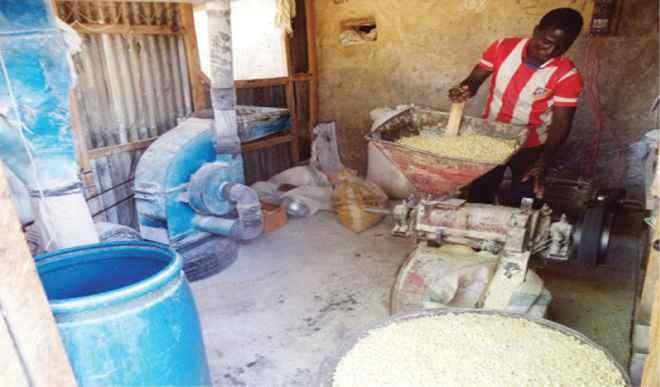Why we grow our own maize – Funtua maize millers
Maize flour producers in Funtua-Katsina State are generating more revenue from maize they grow themselves than buying same from the market, Daily Trust reports. For over 10 years, maize flour business has been striving; especially among youths and women in Funtua and other parts of the state, it has since become the main source of […]


Maize flour producers in Funtua-Katsina State are generating more revenue from maize they grow themselves than buying same from the market, Daily Trust reports.
For over 10 years, maize flour business has been striving; especially among youths and women in Funtua and other parts of the state, it has since become the main source of livelihood to many entrepreneurs.
Malam Abdullahi Maikano has been into the production of maize flour for eight years at Sabon Layi, Funtua. He said to fully exploit the maize value chain in flour making, an entrepreneur needed to be growing his maize rather than buying it from the market.
“It is more profitable when the processes of maize flour production starts from farming the maize. This gives the producer an opportunity to cultivate the maize variety he deems suitable for his production.
“The problem of raising market price of the produce is curtailed as the producer has his maize in stock at a farm price all through his production circle,” Maikano said.
He added that he generated revenue right from the farm by preserving and selling the maize stalks to cattle rearers in February and March, and that the proceeds and that of the maize chaff he sold are used in renting farmland for more cultivation.
Maikano further said he packaged his products in 50kg and 25kg bags which he bought from Kano and print them in Kaduna as there was no printing press in Funtua and its environs.
“We are selling our 50kg flour at N8,000 and the 25kg at N4,000, and we transport our products to far away Borno, Bauchi, Jigawa and Sokoto states.
“We don’t take it to Kano for there are lots of competitors there,” he said.
One of Maikano’s co-workers, Shamsu Mohammed, said there were at least 16 employees in Maikano’s industry; each partaking at a different staged of the flour production.
“Four of us are in charge of the two grinding machines we are using. There are two others that take care of the carts for transporting the semi-finished products to the factory. 10 women are involved in removing chaff from the grains, soaking the grains, sieving, as well as sun-drying the finished flour before packaging,” Shamsu said.
He added that the limited number of employees were always strictly charged to observe hygienic measures in the course of production.
Another entrepreneur, Alhaji Salisu Sa’a Funtua, said despite the progress recorded in the business they still had some problems.
“Irregular power supply tampers with our smooth production and high cost of petrol has been a challenge; especially in transporting our maize flour to various states,” he said.
He further said lack of a formidable association had been a source of concern as they lacked capacity to speak with one voice, as well as adequately control the price mechanisms of their products.
Daily Trust observed that households now preferred to buy maize flour than make it at home for various reasons, which include low income earnings of the majority of the populace which makes it difficult to buy or farm maize.
